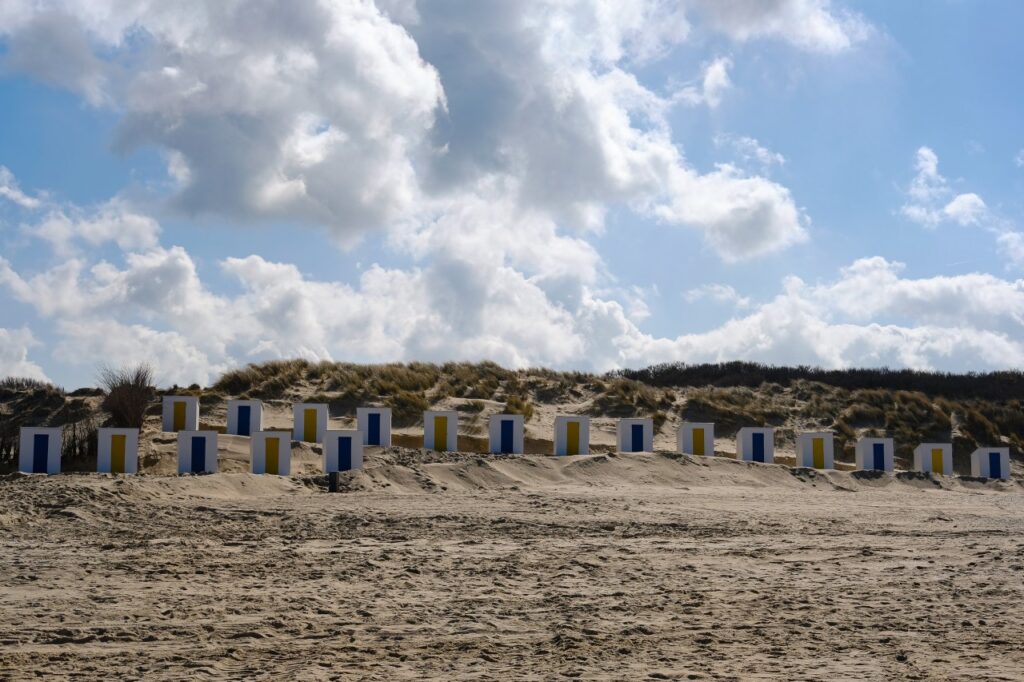
In a world of constant change, and a climate crisis looming, the question is how do we address these challenges as societies and individuals. In this article, Founders of Tomorrow alumni Tilmann Stolte reflects on his journey as an innovation manager and shares his perspective on the role of regenerative innovation for the future. He argues that we have a massive opportunity to build a flourishing world if we go beyond quantitative sustainability metrics and apply regeneration principles and systems thinking to the challenges ahead.
The Next Level of Innovation: Going Beyond Sustainability
When 2021 started, I didn’t really know what I was getting into. I had left my old job with the intention to take some time off, to reflect on what I wanted from life, and to dive deeper into some theories around sustainability-focused business practices. My main questions: What are the big challenges in the world, how can we use innovation to tackle these in a holistic way, and how do I personally fit into all of this? The easy stuff, you know.
My background is in innovation management and I’ve always been fascinated by the opportunities of the future. I remember standing in the middle of Messukeskus in 2016 to attend Slush, the biggest entrepreneurship conference in the Nordic countries, with 15.000 attendees. The advances in technology on display blew me away – self-driving cars, artificial intelligence, 3D printing – and I started to wonder how we could bring these advancements into broader society, to benefit more people and increase their quality of life using smart tech.
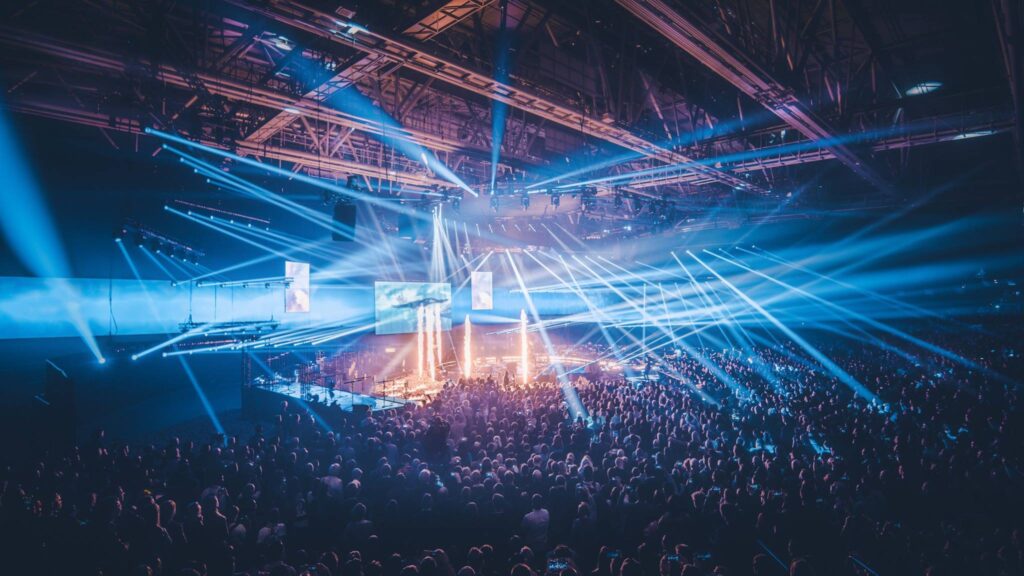
A year earlier in 2015, the Sustainable Development Goals had been introduced by the United Nations as “a shared blueprint for peace and prosperity for people and the planet, now and into the future”. Seventeen global challenges mapped out with the intention to be solved by 2030. An ambitious goal, but combined with the exponentially growing advancements in technologies this also sounded like a promising and achievable target to me.
Over the next four years, I would be working on different initiatives, including impact-investing, startup accelerators, or educational programs, where individuals and companies would work on ideas on how to leverage the most recent developments in tech towards driving impact-focused innovation within their organizations. Growth-mindset development and cultural change included. So far so good.
However, over time I began to notice the lack of a deeper discussion around the ecological systems we are part of. Personally, I did not fully understand e.g. the nuances of individual vs. societal innovation needed to tackle the climate crisis, or how the assumptions around our economic systems shape the world we live in. This changed when I read Doughnut Economics by Kate Raworth and attended a talk held by the author in London.
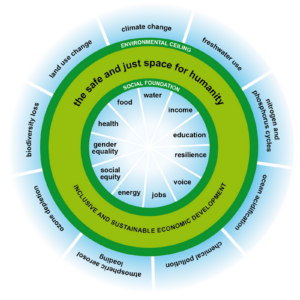
Doughnut Economics essentially describes the interconnectedness between humans and nature and proposes an updated economic model for the 21st century that reflects this connection. In short, humans want to be happy and thrive, while nature flourishes on diversity in complex, interlinked ecosystems. And therein lies the problem: We have built an economy that puts humanity’s comfort over the health of our environment, without really understanding the complex ecological systems around us. We focus on the next goal, the next innovation, the next smart technology, but don’t understand what it means for the planet we inhabit. At least, not until now. In the 21st century, we now have all the tools to connect easily on a global scale. This allows us to see the challenges. To see the bigger picture more clearly. To ask the question of how to re-align our priorities in this world in a responsible way.
What then started was a fun journey: Throwing myself into full research mode, I deep-dived into topics such as the Climate Crisis, Planetary Boundaries, or the Green New Deal. I signed up for the Ellen MacArthur Foundation program “From Linear to Circular” and attended different hackathons, working with people worldwide on challenges around climate tech or the circular economy. Together with friends, I co-founded an initiative, Future Leaders Germany, to facilitate conversations around the role of conscious, responsible leadership for young people. I also started doing project- and consulting work with startups throughout Europe on how to drive sustainable business ideas forward.
The term “Sustainable business ideas” comes with the challenge that it may not be immediately clear to most people. At best, it is connected to an effort to reduce waste, bring down CO2e emissions, consume less, and maybe plant some trees. But taking something away doesn’t really fly with us humans (check out Kahneman and Tversky’s Prospect Theory from 1979 around the psychological effects of loss aversion). So this way of framing isn’t necessarily the sexiest approach to drive societal change. Indeed, for me, it was usually one of the biggest hurdles when discussing sustainable business models with founders, team members, and potential investors. I was missing a more compelling and captivating narrative.
Founders of Tomorrow
Life can be random at times, as it was in my case. I applied to a program in Copenhagen, called Founders of Tomorrow. The theme of the year: “Regenerative visions – beyond sustainability“.
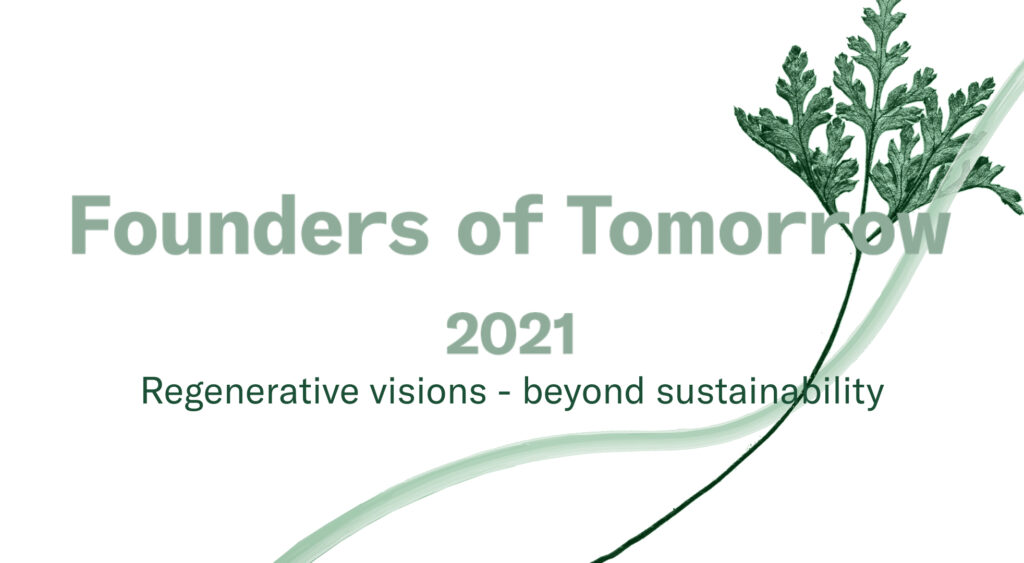
I didn’t even know that there was something ‘beyond’ sustainability. But the one-week full-time program sounded fun and I got involved. In a cohort of fifty-five people of all industries, genders, and age groups we got together to address the big question of how to re-imagine a regenerative future.
Well, cool. Regenerative. What is that precisely? We started learning about concepts such as Regenerative Leadership, Designing Regenerative Cultures, or Biomimicry aka how to use nature as inspiration for product- & system design. We explored the role of self-reflection, imagined potential futures, while simultaneously developing concepts around regenerative business models, regenerative cities, regenerative organizations, and much more. Overall: Twenty-five speakers, panels, workshops, project-work, three locations, 30°C outside.
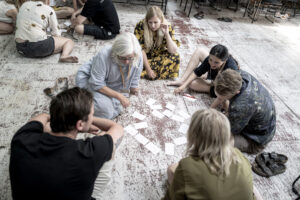
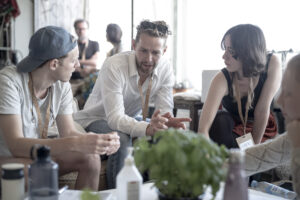
At the end of the week, we presented what we had learned at Børsen, the old stock exchange in Copenhagen; a fancy, old, quite conservative building. On stage: Fifty-five individuals discussing the future of our planet, mainly barefoot, with damp clothes from jumping into the Copenhagen harbor together before the start of the pitching session.
As a result of this week, I define regeneration now as “giving back more than what was taken”. In other words, leaving the spaces we find in a better way than before. Leaving another person happier than they were before. Making sure to replant two trees for each one taken, or to add something else to the ecosystem that nurtures the ecological space.
Regenerative Innovation
What followed was another deep-dive. This time into all the content I had gotten a glimpse of throughout the week: Going ‘beyond’ sustainability.
What fascinated me was the interdisciplinary approach, the interconnectedness, and the playfulness. Thinking about multiple system layers, zooming in and out, making sense and learning about the world around me.
In general, I perceive myself as a rather pragmatic person, and from what I understood, a few core assumptions have come to be accepted in this time we live in:
- The climate crisis is happening, plus an additional overstepping of another three out of nine planetary boundaries that keep our global ecological world functioning.
- Our economic systems are mainly based on a (limited) understanding of our interconnected world that dates back to the 1800s.
- Societal innovation, complemented by technological innovation, can help us to do something about the former two.
The opportunities that are a consequence of this really excite me: We can consciously contribute to a globally connected effort towards building a world in which ecological systems flourish alongside humanity.
As an innovation manager, I appreciate this outlook, as well as the boundaries, that allow us to be creative around what we perceive as normal. I acknowledge that this is not an easy process. Accepting that there are problems in the world makes them real. That can be scary. Change can be scary. To me, the alternative sounds scarier though. Prior to COP26, the United Nations released a video warning about the potential extinction of our species if we don’t change our behavior. Delivering the message: a dinosaur (see the full video here). As comical and creative as this campaign is, the core message is stark. And it holds true. We need to change, and we need to embrace this change instead of fearing it. For this reason, I am looking on the bright side, and I am excited about what we could achieve if we take on the challenge.
With the knowledge we have today we can design regenerative cultures. We can reinvent our organizations, utilizing e.g. teal-approaches where responsibility is more equally distributed among employees, increasing personal motivation, agility in new idea development, and supporting ingenious local solutions & diversity.
We can be regenerative leaders. We can have a look at our own motivations in regards to what actually gives us joy in our day-to-day life, and how we measure success on an individual and societal level. Is it money? Prestige? Access to resources? Or maybe time? How do we want to live? And, consequently, how can we take responsibility to shape the systems around us in a way that makes us happy, while positively contributing to the world as a whole?
Innovation is a big part of all of this, and when I say ‘innovation’ I mean rethinking and creatively working on ideas that recombine the ‘old’ with a potentially better outlook towards our shared future (e.g. using TheoryU). I mean taking regeneration principles and systems-thinking as the foundation to guide our exploration. And I mean reconnecting to introspective tools, indigenous knowledge, and conscious decision-making to allow a future to emerge that is based on the right intentions.
2021 started with a lot of uncertainty for me: How can I build a future, a career path, a joyful life? I didn’t find all the answers. Instead, I found a vision: I am going beyond sustainability.

 Tilmann is an innovation manager focusing on regenerative systems thinking. His former work includes strategic business development for Rocket Internet and exponential technology education for Fortune 500 organizations at SingularityU Nordic. He is co-initiator of Future Leaders Germany, and lives in Copenhagen, Denmark.
Tilmann is an innovation manager focusing on regenerative systems thinking. His former work includes strategic business development for Rocket Internet and exponential technology education for Fortune 500 organizations at SingularityU Nordic. He is co-initiator of Future Leaders Germany, and lives in Copenhagen, Denmark.
